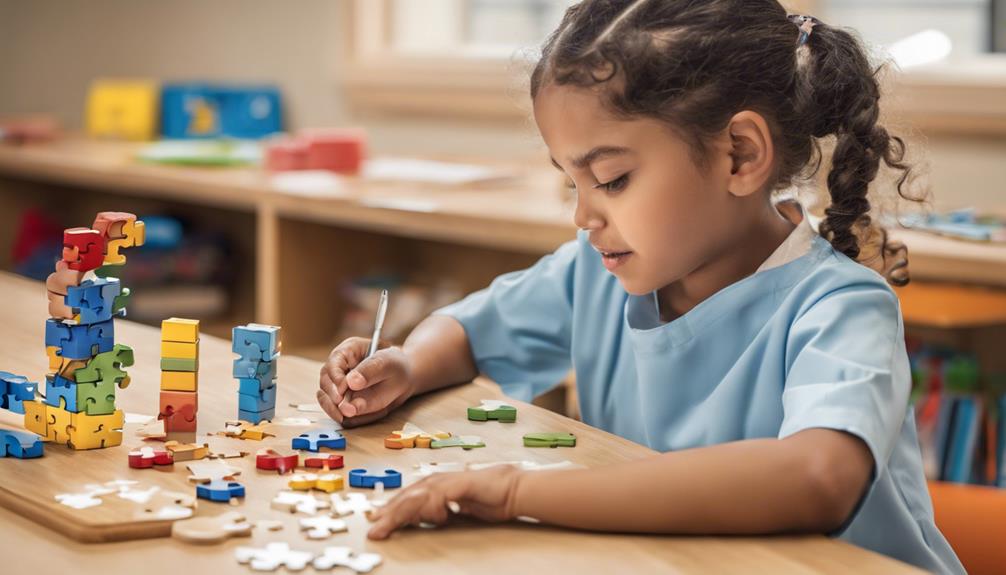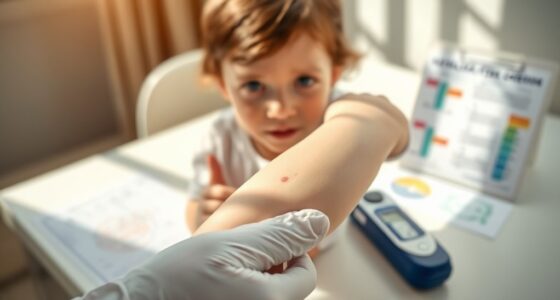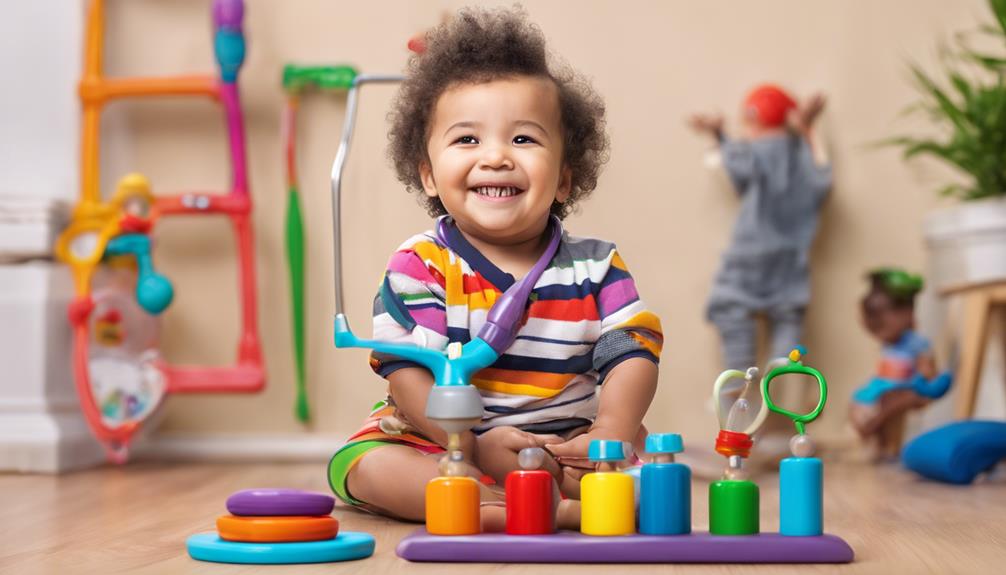As we navigate the intricate map of children's development, we often find ourselves deciphering the clues that reveal their progress. But how do we truly guarantee we are on the right path?
By exploring the multifaceted avenues of monitoring, we can illuminate the way forward, shedding light on the steps necessary for a thorough understanding.
Through a collaborative effort involving various stakeholders, we uncover the hidden gems that expose a child's journey towards growth and success.
Let's unravel the intricacies of this crucial process, piece by piece.
Key Takeaways
- Early identification through screenings and milestones tracking aids in monitoring children's developmental progress effectively.
- Collaborative efforts among parents, caregivers, educators, and healthcare providers are crucial for holistic development monitoring.
- Utilizing specialized tools like ASQ, PEDS, and M-CHAT enhances early identification and intervention for developmental delays.
- Regular well-child visits and baseline comparisons are essential for timely interventions and personalized learning environments.
Importance of Development Tracking
Monitoring children's development progress plays an essential role in early identification of delays and facilitating timely interventions to enhance outcomes. Developmental tracking is pivotal as it helps in identifying issues early on, with statistics showing that 1 in 6 children in the US have developmental disabilities.
By actively monitoring a child's progress, educators and caregivers can create ideal learning environments tailored to individual needs. This personalized approach guarantees that children receive the necessary support and interventions to thrive. Tracking development provides a baseline for comparison, enabling the detection of any atypical patterns that may indicate developmental concerns.
Through analyzing various aspects such as speech, play, problem-solving, and behavior, educators can pinpoint areas that require attention and implement targeted interventions. Ultimately, monitoring a child's development progress not only aids in early identification of developmental delays but also sets the stage for effective interventions that promote positive outcomes.
Who Conducts Development Monitoring?

Parents, caregivers, teachers, and healthcare providers are integral in conducting development monitoring to guarantee children's growth and milestones are observed and assessed over time. Pediatricians and early childhood specialists play a vital role in this process, utilizing their expertise to identify any potential developmental concerns. Educators in early childhood settings also actively contribute by providing valuable insights into children's progress and behavior in a learning environment. Regular well-child visits are a common platform where healthcare professionals engage in developmental monitoring, ensuring that children are meeting appropriate milestones.
Healthcare providers, including pediatricians, are trained to conduct thorough observations and assessments during these visits, allowing for early detection of any developmental delays or issues. Parents and caregivers, who've a deep understanding of their child's daily routines and behaviors, play a vital role in providing valuable information to healthcare professionals for a comprehensive evaluation. By involving a collaborative effort between parents, caregivers, educators, and healthcare providers, development monitoring becomes a holistic approach to ensuring children reach their full potential.
Methods for Developmental Screening

Utilizing specialized developmental screening tools is an important component in evaluating children's progress and identifying potential developmental delays or issues early on. These screenings, such as the Ages and Stages Questionnaires (ASQ), Parents' Evaluation of Developmental Status (PEDS), and Modified Checklist for Autism in Toddlers (M-CHAT), are recommended at specific ages to detect any developmental concerns promptly. Professionals such as doctors, pediatricians, speech pathologists, and behaviorists are typically involved in conducting these screenings. By utilizing these screening tools, professionals can guarantee reliable and valid assessment results, leading to appropriate interventions when necessary.
Early identification of developmental issues through screenings is essential as it can pave the way for better outcomes and support for children's development progress. Timely interventions based on the results of these screenings can have a significant impact on a child's developmental trajectory, providing them with the necessary assistance and resources to thrive. Prioritizing developmental screening as part of routine care can lead to improved developmental outcomes and better overall well-being for children.
Key Tools for Monitoring Progress
To effectively track children's developmental progress, it's imperative to employ a combination of standardized questionnaires and digital tools designed for thorough monitoring. Here are some key tools for monitoring progress:
- Standardized Questionnaires: Utilize tools such as the Ages and Stages Questionnaire (ASQ), Parents' Evaluation of Developmental Status (PEDS), and Modified Checklist for Autism in Toddlers (M-CHAT) to assess different developmental domains comprehensively.
- Typical Milestones: Regularly check for milestones in areas like playing, learning, speaking, behaving, and moving to ensure children are progressing as expected.
- Involvement of Parents and Caregivers: Engage parents, grandparents, and caregivers in the monitoring process as they play a vital role in observing and reporting children's behaviors and achievements.
- Screenings for Early Detection: Administer screenings at specific ages to identify any developmental concerns early on, allowing for timely intervention and support.
Role of Early Intervention

Upon recognizing developmental concerns in children, the role of early intervention becomes pivotal in ensuring timely support and fostering prime growth and well-being.
Early intervention services are instrumental in providing specialized assistance to children with delays or disabilities, greatly enhancing their overall development. Through therapies targeting speech, movement, learning, and interaction, these programs play a critical role in addressing specific needs and facilitating progress in child development.
Child Find programs are essential in evaluating children to identify those requiring early intervention services promptly. Additionally, the Individuals with Disabilities Education Act (IDEA) mandates that children with diagnosed disabilities receive appropriate special education services, further emphasizing the importance of early intervention.
Frequently Asked Questions
How Can Growth and Development Be Monitored in Children?
We monitor children's growth and development by tracking milestones like first smiles and words, observing progress in cognitive, motor, social, and adaptive skills, and using tools like CDC Milestone Tracker App and ASQ for assessments.
How Do We Measure the Development of the Child?
We measure child development through milestones like first smiles, rolling over, walking, and speaking words. Monitoring over time helps detect delays early. Standardized tools like ASQ, PEDS, and M-CHAT assess various domains, leading to better treatment outcomes.
How Do You Monitor Developmental Milestones?
We observe developmental milestones regularly, noting progress in physical, cognitive, social, and emotional areas. Comparing against typical milestones helps us catch delays early. Discussing concerns with healthcare providers can lead to needed evaluations and interventions.
Which Skills Are Included When Monitoring a Child's Development?
When monitoring a child's development, we examine a range of skills like cognitive, motor, social, emotional, and language abilities. These include problem-solving, social interactions, language development, and physical milestones. It's crucial for tracking progress.
Conclusion
In summary, monitoring children's developmental progress is essential for early intervention and support. Research shows that early identification of developmental delays can lead to better outcomes for children.
According to the CDC, 1 in 6 children in the United States have a developmental disability, highlighting the significance of regular monitoring and screening.
By utilizing tools and strategies to track development, we can guarantee that every child reaches their full potential.








